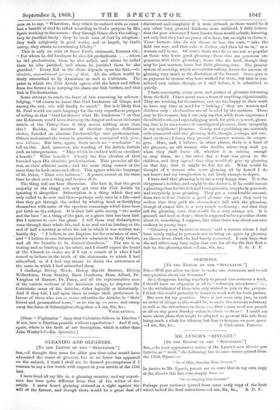GLEANING AND GLEANERS.
[TO THE EDITOR OF THE "SPECTATOR."] SIR,—I thought that some far abler pen than mine would have advocated the cause of gleaners, but as no letter has appeared on the subject, I trust I shall not be deemed presumptuous if I venture to say a few words with respect to your article of the 15th inst.
I have lived all my life in a gleaning country, and my experi- ence has been quite different from that of the writer of the article. I never heard gleaning claimed as a right against the will of the farmer, and though there would be a great deal of
discontent and complaint if it were refused, as there would be if any other long granted kindness were withheld, I fully believe that the poor wherever I have known them would submit, knowing not only that they had no power of redress, but no right to claim it. Those farmers who do not choose to lose the corn, "rake the field one way, and then rake it Vother, and then let us in," as a woman said to me. Of course those Who do so are not so popular as those who leave good gleaning ; those who are generous are generous with their gleaning ; those who are hard, though they may be just masters, leave but little gleaning corn. The present system of mowing, which necessitates raking, leaves the amount of gleaning very much at the discretion of the farmer. Some give it as payment to women who have worked for them, but that is con- sidered very unfair, though, as I said before, it is submitted to quietly.
I have constantly, every year, met parties of gleaners returning from the field. I have never seen a trace of anything objectionable. They are working for themselves, and are too happy in their work to have any time or need for "larking ;" they are women and children only ; the families are all headed by the mothers. These may be the reasons, but I can only say that while from experience I dread fieldwork, and especially gang work, for girls very much, glean- ing time is to me a source of unmitigated pleasure, from sympathy in my neighbours' pleasure. Gossip and squabbling are certainly evils connected with the gleaning field, though, perhaps, not con- fined to them ; I fancy they prevail wherever women do congre- gate. Here, and, I believe, in other places, there is a head of the gleaners, an old woman who decides where they shall go, when they shall leave off, whether it is raining enough to stop them, &c. ; the other day a feast was given to the children, and they agreed that they would all give up gleaning on that day, that it might be fair for all. What would be thought of a woman who went 'gleaning all by herself I do not know, and my imagination is not lively enough to depict.
I have said that gleaning is to me a very happy time. It is the clergyman's holiday, and might be the doctor's, if he could invent a gleaning-time for his rich and town patients; everybody gets well, and everybody goes gleaning. They get a considerable amount, from two to four bushels a good gleaner can get ; they used to reckon that they paid the shoemaker's bill with the gleaniug, though of course this is a very rough reckoning ; not that they sell the gleaning corn, that would be a very strange act. it is ground, and used as flour ; there is supposed to be a peculiar charm about it, something, I suppose, like what there was about our own cookery in young days.
"Gleaning corn do taste so sweet," said a woman whom I had been vainly trying to persuade not to bring on again by gleaning an illness from which title had barely recovered. I only hope that she and others may long enjoy that cure for all the ills that flesh is
heir to, the gleaning-time.—I am, Sir, &c., E. G. T. F.






























 Previous page
Previous page